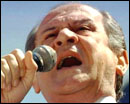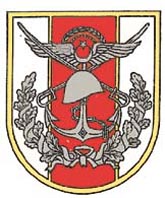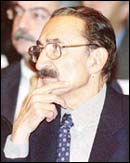4
June 2002
![]()
2. "Sweden tells Turkey EU bid hinges on progress on human rights", Sweden told Turkey on Monday that its bid to join the European Union will not move forward unless it shows progress in improving human rights.
3. "Rights court won't affect Ocalan fate", far-right Deputy Prime Minister Devlet Bahceli said on Sunday Turkey's decision to carry out the death sentence on Kurdish leader Abdullah Ocalan would not be affected by any ruling of the European Court of Human Rights.
4. "Turkish military intervenes in EU debate", Turkey's powerful military appears to be bringing a gloved hand gently to bear on government as disarray over Turkey's European destiny grows with Prime Minister Bulent Ecevit's illness.
5. "Pressure mounts for ailing Turkish premier to resign", Bulent Ecevit, Turkey's ailing 77-year-prime minister, is facing increasing pressure to resign to stem uncertainty that is threatening prospects of an economic recovery this year.
6. "Iraqi exile groups in disarray", organizations are wary of Washington and one another.
1. - AFP - "Turkish state mobilizes against Kurdish names":
This article has been deleted due to threats of Thomas Seibert's lawyers against numerous websites. ![]()
2. - AFP - "Sweden tells Turkey EU bid hinges on progress on human rights":
STOCKHOLM / 3 June 2002
Sweden told Turkey on Monday that its bid to join the European Union
will not move forward unless it shows progress in improving human rights.
"Turkey cannot go further in the EU process if it does not show in a credible manner that it is taking the human rights issue seriously," Foreign Minister Anna Lindh told parliament, according to the IT news agency. The foreign minister however rejected that idea that Turkey not be considered a candidate to join the European Union.
To reject Turkey's candidacy would only strengthen the position of those in Turkey who oppose democracy and reform, she said. Turkey has been a candidate for EU membership since 1999 and is the only one among the 13 hopefuls not to have begun accession talks with the 15-member bloc.
The bid has stalled over EU requirements such as abolishing
capital punishment and lifting a ban on Kurdish language broadcasts
and education, issues that have sharply divided Turkey's governing coalition.
![]()
3. - Reuters - "Bahceli: Rights court won't affect Ocalan fate":
ANKARA / 4 June 2002
"The European court's decision will not affect in any way the
decision made by Turkey's national court and parliament's will to process
the enforcement," Bahceli told reporters.
Far-right Deputy Prime Minister Devlet Bahceli said on Sunday Turkey's decision to carry out the death sentence on Kurdish leader Abdullah Ocalan would not be affected by any ruling of the European Court of Human Rights.
A Turkish security court sentenced Ocalan to death in 1999 for leading the outlawed Kurdish Workers Party's (PKK) violent campaign for a Kurdish homeland in southeastern Turkey. More than 30,000 people have died since fighting erupted in 1984.
"The European court's decision will not affect in any way the decision made by Turkey's national court and parliament's will to process the enforcement," Bahceli told reporters.
Bahceli's comments could create further unease in financial markets -- already worried about Prime Minister Bulent Ecevit's health -- that friction over sensitive reforms could wreck a bid by the fragile ruling coalition to drag Turkey out of recession.
Turkey has for decades aspired to join the European Union but has struggled since winning candidacy status in 1999 with human rights reforms, including abolishing capital punishment and allowing freer use of the Kurdish language.
Turkey agreed to stay Ocalan's execution until the court ruled on Ocalan's appeal. Ocalan's lawyers accused Turkey of violating his rights beginning with his capture by special forces in Nairobi in 1999.
The Strasbourg-based court agreed to hear Ocalan's appeal in 2000, ruling that his complaints were admissible under several articles of the European Convention on Human Rights, including the right to life and the right to a fair trial.
The president of the court said in April a decision could be made this year, possibly before its summer recess.
Turkey is a signatory to the Convention but has never ratified the accord, which outlaws capital punishment.
However, Turkish political parties favouring abolition of the death sentence, including Prime Minister Bulent Ecevit's Democratic Left party, might feel further weight given to their cause from a court ruling against the sentence.
Campaign pledge
Bahceli's Nationalist Action Party (MHP), which is a member of the ruling coalition, pledged in the 1999 general election campaign Ocalan would hang if he were sentenced to death.
The party has also chafed at granting the country's 12 million Kurds the right to teach and broadcast in their mother tongue, another key step Turkey must take to meet EU critiera.
Efforts have picked up in recent weeks to push forward Turkey's lagging drive to launch membership talks with Brussels.
Turkish President Ahmet Necdet Sezer is to hold talks this week on tackling the debate. The military-dominated National Security Council said last week Turkey must speed up reforms.
Turkey has not executed anyone since 1984, and a constitutional amendment last year scrapped capital punishment for peacetime offences, except for "terrorism" or treason.
Opinion polls show more than four in five Turks want to join the EU, but around half want to do so without making concessions on the death penalty or Kurdish language rights.
Muslim Turkey's candidacy is a source of pride for those
who want the NATO ally firmly rooted among Western democracies. ![]()
4. - Reuters - "Turkish military intervenes in EU debate":
ANKARA / 4 June 2002 / by Ralph Boulton 
Turkey's powerful military appears to be bringing a gloved hand
gently to bear on government as disarray over Turkey's European destiny
grows with Prime Minister Bulent Ecevit's illness.
"The military wouldn't want the uncertainty of elections and they don't want to see the coalition tear itself apart on the European issue," said one experienced Ankara diplomat. "They seem to be softening on the EU, putting pressure on the right."
Generals seen widely as a counterweight to weak political leaders dealt a slap last week to rightist vice-premier Devlet Bahceli when the military-civilian National Security Council (MGK) urged swift reforms to qualify for European Union membership talks.
Media leaks suggested the army might accept some Kurdish language education, outside the state curriculum, and agree under conditions to full abolition of capital punishment, which would allow jailed Kurdish rebel leader Abdullah Ocalan to escape the death penalty.
The MGK, meeting in Bahceli's absence, proposed lifting a state of emergency in the mainly Kurdish southeast this year.
All these are steps urgently advocated by pro-Europe forces seeking a nod on membership talks from an EU summit in December. Nationalists stepped up opposition last month as Ecevit ailed, his hold on government waned and calls for his resignation rose.
The debate assumed an almost comic character last week with Bahceli proclaiming his feelings from China, where he was on an official visit. Such liberalisation now, he said, could reignite Kurdish "terrorism" which had cost 30,000 lives.
"The MHP (the rightist Nationalist Action Party) has put forth its views on the issue of EU (membership). Some may agree, some disagree, that's normal," he said. He then added, with a forthrightness bordering on impudence in a country where the army cannot be contradicted lightly:
"We respect the views of military authorities. We say what we think." He also recalled the MGK was an advisory body. The statement is true, but that advice carries military weight.
Army scepticism of EU
The MHP is the second biggest party in the three-party coalition after Ecevit's Democratic Left Party (DSP). Bahceli could take over as interim premier if Ecevit were forced to step down and if the coalition held together. It might not.
The coalition is riven on the EU, with the MHP at odds with Ecevit's party and the conservative Motherland Party, the third party in the ruling coalition.
Ecevit, whose ailments appear to mount from week to week, argues there would be chaos if he left. Markets drift down, fearing government instability could undermine a multi-billion dollar crisis plan.
The army's world view may overlap in some areas with Bahceli's MHP. In broad terms, both instinctively prize the state over the individual and view the world outside with a little suspicion.
A top general attacked the EU recently, saying Ankara might do better to seek friends, besides Washington, in Tehran and Moscow. Top commander Huseyin Kivrikoglu is also sceptical.
But for all their reservations, the General Staff would flinch at the "anti-EU" label. They see NATO member Turkey's economic and political destiny, one way or another, in Europe.
Generals may covet the power they have used four times since 1960 to unseat governments deemed a threat to secular democracy. But they know open political intervention can divide their ranks and even undermine the great popular esteem they enjoy.
These days, there is no talk of coups.
One general described an MGK-led political pressure campaign which brought the resignation of Islamist premier Necmettin Erbakan in 1997 as the "fine tuning of democracy".
Generals intervene more gently behind the scenes, through the MGK, media or messages passed by trusted politicians. There is little or no social contact. The military hand is gloved.
The General Staff has made its views clear to the MHP. It remains to be seen now how Bahceli reacts when coalition leaders meet on Friday for a special summit under President Ahmet Necdet Sezer to discuss Turkey's drive for EU reforms.
Ecevit, 77, who missed last week's eventful MGK meeting because of illness, has said he will be present. The military, not present, will be looking for signs of reconciliation.
Diplomats say the military, like markets, are conservative, seeking stability and continuity whether or not Ecevit stays.
The outcome of elections would be very uncertain. The present coalition parties might fail to reach the 10 percent threshold necessary for parliamentary representation.
Worse still for the military, the opposition AK Party, which they view with such suspicion because of its roots in political Islam, could well emerge as the largest party.
If, indeed, the military helps bring the MHP to heel over
Europe and calm the coalition, there will be an element of irony. One
of the chief concerns among EU countries over Turkey is the influence
the generals wield in politics. ![]()
5. - The Financial Times - "Pressure mounts for ailing Turkish premier to resign":
ANKARA / 4 June 2002 / By Leyla Boulton 
Bulent Ecevit, Turkey's ailing 77-year-prime minister, is facing
increasing pressure to resign to stem uncertainty that is threatening
prospects of an economic recovery this year.
Political analysts said yesterday that important segments of the business community as well as the influential armed forces - seen as a stabilising factor in times of crisis - favour the appointment of Husamettin Ozkan, Mr Ecevit's right-hand man, as caretaker prime minister.
Mr Ozkan, a suave political operator who stays out of the public eye, is also the only potential substitute from Mr Ecevit's Democratic Left party (DSP) acceptable to the rightwing National Action party (MHP), the other main component of the three-party coalition.
Expectations that elections will take place before they are due in 2004 have been fuelled by Mr Ecevit's health problems. But business leaders and even some opposition politicians want to delay early elections until next year.
Turkey is still in the throes of important structural reforms, backed by a $16.3bn (ý11bn, €17.4bn) loan from the International Monetary Fund. Simultaneously, Ankara is hoping, by pushing through a raft of overdue human rights reforms, to persuade the EU to name at its Copenhagen summit in December a tentative date for starting accession talks.
For his part, Mr Ecevit has said he fears worse damage if he quits. But supporters of this view, who once saw the prime minister as irreplaceable, have diminished in number since he missed an important meeting of civilian and military leaders three days after leaving hospital declaring himself to be "fine and in charge".
Rahsan Ecevit, the prime minister's wife, who is also deputy-chairman of the DSP, has come under particularly fierce attack. Critics want her to encourage Mr Ecevit to step down from government and appoint a credible successor to lead the DSP.
Echoing political circles and media commentators, Tuncay
Ozilhan, chairman of Tusiad, the business federation, urged the Ecevits
late on Sunday to "plan" for the fact that the prime minister's
health meant he could no longer "perform important services for
the country". ![]()
6. - The Washington Post - "Iraqi exile groups in disarray":
Organizations are wary of Washington and one another
LONDON / 3 June 2002 / by Daniel Williams
Ahmed Chalabi, the perennially beleaguered Iraqi exile leader, put
down the phone after a recent call from Washington, happy to learn that
State Department money would flow again to Liberty TV, the station he
runs to beam propaganda to his homeland.
"Another episode in the Battle of Washington," he said, sighing. "That battle has to finish before the battle against Saddam Hussein begins."
Chalabi runs the Iraqi National Congress, nominally the umbrella organization of Iraqi groups opposed to Saddam's rule and long expected to play a prominent role in toppling the Baghdad government. But recent disputes suggest that the issue of his organization's role is far from settled.
That is not Chalabi's only problem. A trip through London, the base for many Iraqi dissidents, suggests that the organization is an umbrella that covers hardly anyone. Groups that have operated under its shelter come and go with the changeable winds of U.S. and Iraqi exile politics.
The disarray is testimony to the decade-long failure of the United States to forge a united front against Saddam. That failure is now more urgent as the Bush administration turns up its rhetoric about the need for "regime change" in Iraq - although it has reportedly put off any invasion until at least next year..
What role will dissident groups and their followers in Iraq play in any battle? Who will replace Saddam if there is a war? Among Iraqi exile leaders, neither question has been resolved..
The exiles' experience with the United States makes them wary of signing on to a new project. They believe they have been betrayed twice by Washington since 1991: first, when President George Bush encouraged the Iraqi people to rise up after the Gulf War but withheld military support; and in 1996, when the Clinton administration abandoned a CIA plan to support an invasion of central Iraq by Kurds in the north. Saddam's forces then invaded Kurdish areas with impunity.
Chalabi concurs with reports from Washington that the Bush administration is divided on what to do. The State Department and CIA are trying to marginalize him, he said, against the wishes of the Pentagon and allies in Congress. The latest example, in Chalabi's view, is the flap over television money.
In January, the State Department suspended many of its grants to the Iraqi National Congress, alleging widespread accounting problems, including lack of documentation for almost $578,800 in cash payments. The organization acknowledged a need to strengthen internal financial controls but denied that any U.S. funds were improperly used.
For several months, Liberty TV had been operating under monthly grants of $1.3 million while the organization negotiated new, longer-term funding with the State Department. Chalabi attributes the cutoff to "personal animus" and old disagreements on how to topple Saddam..
A State Department official in Washington said that talks were under way with the Iraqi National Congress over funding. "We're almost there on negotiating a grant," the official said.
Chalabi aides perceive a further move to sideline the organization in a recent meeting between Bush administration officials and top representatives of two Kurdish components of the organization, the Patriotic Union of Kurdistan and the Kurdistan Democratic Party. The Americans approached the two groups about setting up CIA offices in northern Iraq, where they command separate territories under the barrels of Hussein's tanks.
Although both groups are ostensibly aligned with the Iraqi National Congress the Kurdistan Democratic Party openly expresses discontent. "We still belong to the INC, but we are not active in it. I'm not sure the INC is an effective tool for change," said Hoshyar Zebari, the group's international relations director.
Another exile grouping, the Supreme Council for the Islamic Revolution in Iraq, has dropped out of the organization. The council represents elements of the restive Shiite population in southern Iraq and parts of central Iraq.
A contest over who collectively represents the anti-Hussein
opposition seems to be shaping up. The two Kurdish components of the
Iraqi National Congress, Bayati's group and a Shiite-based organization
with strong CIA connections, the Iraqi National Accord, have created
another alliance, called the Group of Four. Bayati said the group represented
the "core" of resistance to Saddam. The Iraqi National Congress,
he said, is just "one of many groups." ![]()